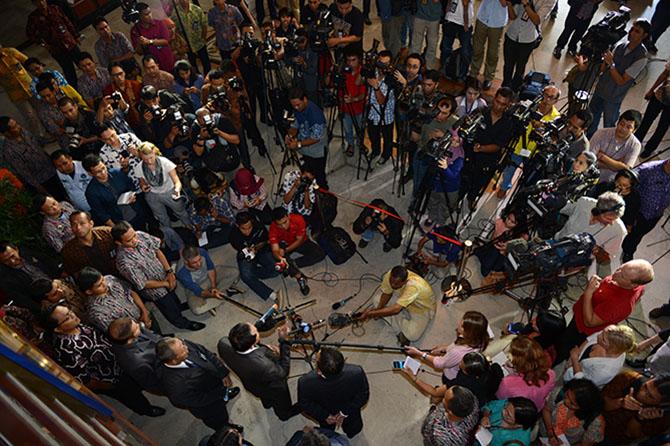
While Australia’s media saw the looming executions as a major news story, Indonesian media organizations generally ranked the story well down on their list of priorities or took the angle that it was an issue of “national sovereignty.” While some reports provided information about the individuals on death row, there was little investigation of the effectiveness of the death penalty or whether the condemned had received fair trials. The dubious but much-quoted figure of Indonesia having 50 drug-related deaths each day (later reduced to 33) was largely unscrutinized. When I asked one Indonesian television reporter why there was not more discussion about the death penalty policy in the news, she responded, “We are just waiting to see whether Jokowi (Joko) can really commit to what he said.” Should he have halted the executions, much of the Indonesian media would have reported: “President backs down due to pressure from other countries.”
A select few Indonesian scholars, journalists and activists advanced other reasons for Indonesia to rethink its death penalty policy. Shouldn’t those who have reformed while on death row be granted clemency? Is there really a drug “emergency”? Even if there is, does executing drug mules solve the problem? These questions held little weight in the mainstream media in Indonesia. But media coverage, particularly content encouraging interaction via social media, is often based on what will raise emotions. The issue certainly gained traction among Indonesian news companies once foreign countries publicly opposed the executions. The big story was the hyper-nationalist posturing on both sides, and especially any incidents that supported the view that this was yet another Australia–Indonesia flashpoint.
Tony Abbott’s reminder of Australian disaster aid to Indonesia’s Aceh Province after the 2004 Indian Ocean tsunami played a key role in shifting the conversation away from the death penalty and led to a highly defensive response in Jakarta. His comments were considered emotive and unnecessary – a point made by everyone from university professors to ojek (motorcycle taxi) drivers who had never finished high school. Further fueled by the social media-driven “Coins for Australia” campaign, Indonesia’s media jumped on Abbott’s comments. There was even a collection box at the entrance to the press room in Indonesia’s Parliament building. Local media reported that a protest outside the Indonesian consulate in Sydney had “terrorized” its occupants, and asked experts whether Indonesians in Australia were safe. Many Indonesians began defining the campaign against the death penalty as “the Australian position,” rather than more accurately attributing it to the United Nations and many countries around the world that abhor capital punishment.
Conversely, in the Australian media, the story largely revolved around the circumstances of Andrew Chan and Myuran Sukumaran, their lives in the prison system, their stories of reform and what they and their families were going through. Few Australians would have been left unsure about the transformation these two individuals had undergone. (One documentary was titled “The Painter and the Pastor.”) In Indonesia, meanwhile, Chan and Sukumaran were often described as “kingpins,” “masterminds” and “ringleaders.” As Schapelle Corby and other stories showed, in the contemporary news media, events are subject to instantaneous, rolling coverage.
If Western journalism is supposed to be the “who, what, when, where, why,” the salient feature of the coverage of Chan and Sukumaran’s executions was “when.” When are they on the list for execution? When would they be transferred from Bali? When would they be given 72 hours’ notice? When were they likely to be shot? Others on death row in Indonesia, in particular African nationals, rarely had their story told. Was this another form of nationalist posturing through the media, with only Australian lives seeming to matter? In the eyes of many Indonesians, yes. But while many commented that the Australian media was reporting only on Chan and Sukumaran, they also pointed out that the job of Australian journalists was to report for their domestic audience.







 resized.png)
